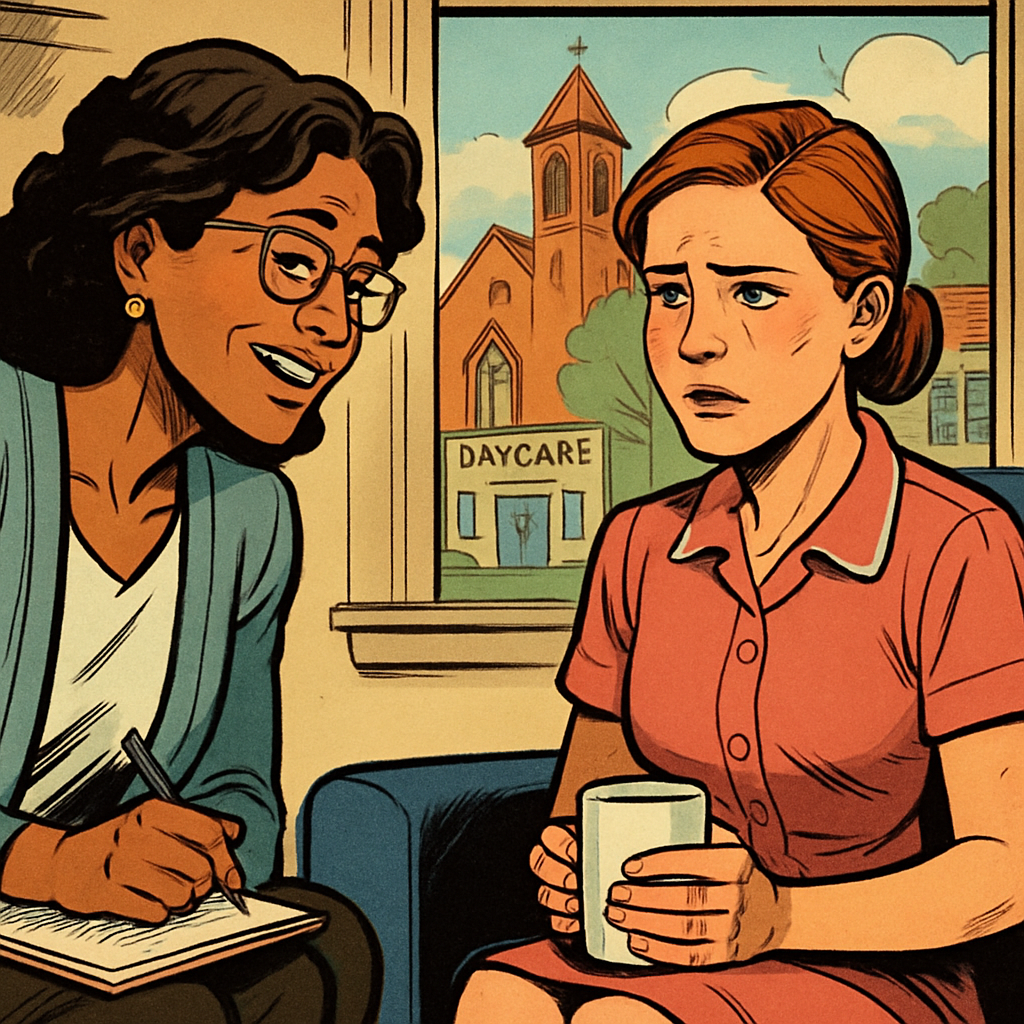It was 8:45 on a Tuesday morning when Emily walked into my office clutching a coffee cup like it might save her life. Her knuckles were white against the cardboard, her eyes hollow with the particular brand of betrayal that only comes when those we trust pull the rug out from under us. She was dressed impeccably – that polished preschool teacher look that manages to be both practical and put-together despite the daily barrage of finger paints and fruit juice spills.
“My church closed their daycare,” she said before even sitting down. “So I opened my own. And now they’re cutting my pay at the church. Tell me I’m not crazy for thinking they’re trying to sabotage me.”
Emily wasn’t crazy. But she wasn’t entirely right either. And that’s where things get interesting.
The Betrayal Economy 💔
Here’s what nobody tells you about feeling betrayed: it’s rarely about the actual incident and almost always about the story we’ve been telling ourselves. Emily had woven her identity around being the church’s trusted childcare provider. The emotional bytes stored in her body carried years of positive feedback, children’s hugs, and parental gratitude – all wrapped in the warm glow of serving her faith community.
When institutions make decisions that affect our livelihoods, we personalize them. We can’t help it. Our brains are wired to create narratives that center us as either the hero or the victim. Rarely do we cast ourselves as minor characters in someone else’s financial spreadsheet.
“They know I need this money,” Emily said, tears threatening. “I’ve given everything to this church for years.”
I nodded. “And now you’re wondering if your loyalty meant anything at all.”
The truth is, churches are businesses too. They just dress it up differently. The pastor who avoids compensation conversations isn’t necessarily plotting against you – he’s probably just as uncomfortable with money talk as the rest of us, except with an added layer of divine discomfort.
What Emily was experiencing wasn’t sabotage. It was something far more mundane and therefore more painful: institutional indifference.
The Self-Doubt Spiral 🌀
When Emily started her own daycare, she activated a classic emotional frame I’ve seen countless times – the independence threat response. Any move toward autonomy can trigger anxiety in systems that benefit from our dependency. But it also triggers our own internal doubt systems.
“Maybe I shouldn’t have opened my own place,” she whispered. “Maybe I overstepped.”
Have you noticed how quickly we question our own judgment when faced with disappointment? How readily we assume we’ve broken some unwritten rule rather than simply outgrowing a situation that no longer serves us?
The self-doubt spiral is particularly vicious for high-achieving women who’ve been conditioned to believe their success depends on perfect compliance with often invisible expectations. Emily’s emotional scripts were running on overdrive, searching for what she’d done “wrong” rather than recognizing she’d simply acted in her own best interest.
Questions to Break the Spiral 🤔
Ask yourself these when caught in a similar spiral:
- Would I judge a friend as harshly as I’m judging myself right now?
- Am I confusing someone’s reaction to my choices with the validity of those choices?
- What would I do if I weren’t afraid of disappointing others?
- Whose voice is really speaking when I question my worth or decisions?
- What need am I trying to meet with this self-criticism?
Power Plays and Puppet Strings ⚡
The most revealing moment came when Emily said, “I just don’t understand why they can’t be happy for me.”
Oh, but I do.
Institutional relationships – whether with churches, corporations, or even families – operate on unspoken power dynamics. Your growth threatens the status quo. Your independence challenges the narrative that the institution is essential to your wellbeing.
Emily’s church wasn’t being malicious. They were simply responding to a shift in the relationship’s power balance. When she opened her daycare, she transformed from asset to competition. The pay cut wasn’t personal sabotage – it was an impersonal recalibration.
This is where emotional granularity becomes essential. Instead of experiencing one overwhelming feeling of “betrayal,” Emily needed to separate the threads: disappointment in the institution, pride in her own initiative, fear about financial stability, and grief for a changing relationship with her faith community.
By our third session, Emily had stopped using the word “sabotage.” Instead, she talked about “consequences” – not punishments for her actions, but natural outcomes of a shifting dynamic. This subtle reframing transformed her from victim to participant.
She still felt the sting of the pay cut. But she recognized it as part of a larger pattern rather than a targeted attack. And in that recognition came the first hints of freedom.
🌟 Core Insight
When institutions make us feel small, perhaps it’s because we’ve outgrown the space they allocated for us.
The childcare center she opened? It’s thriving now. She hired two assistants last year. Sometimes the best revenge isn’t getting even – it’s getting ahead. ✨
— Lola Adams, noticing that we often mistake institutional indifference for personal betrayal when what’s really happening is we’re becoming too big for someone else’s plans
Related Resources:
Duke University Research on Institutional Dynamics
2025 Church Budget and Compensation Changes
Barna Research: Pastor Compensation Trends
Rethinking Church Staff Compensation
Church Leadership Compensation Analysis

